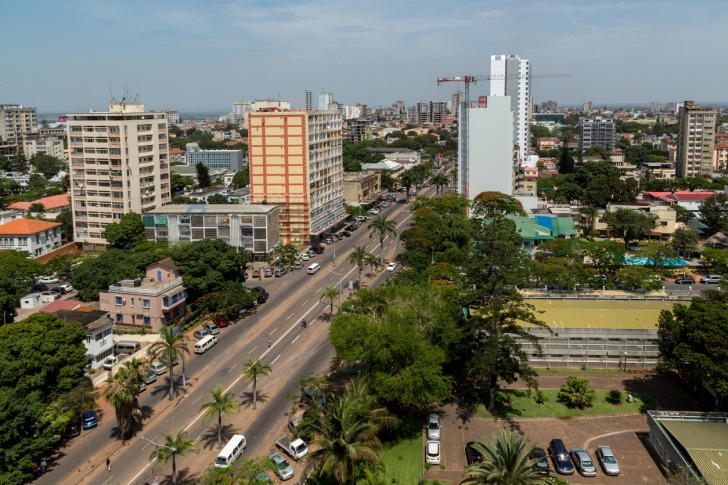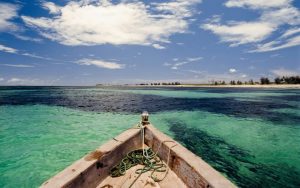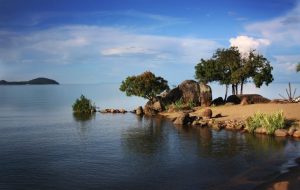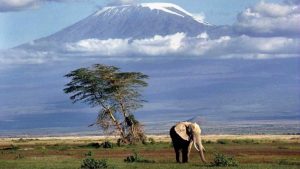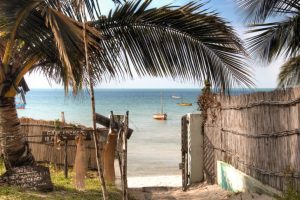 Mozambique : Safety by City
Mozambique : Safety by City
Mozambique - safety as a country Situated on the Indian Ocean in Southern Africa, Mozambique shares borders with South Africa, Tanzania, Swaziland, Zimbabwe, Zambia, and Malawi.
Toward the southern end of the country is Maputo, the country’s capital.
The area is best known for its stunning beaches with crystal clear, turquoise water, making the resorts popular.
Also, Maputo boasts many colonial-era architecture, specifically Portuguese, which you can feel the influence in all aspects of life.
Maputo has a bad reputation for violent crime, scams, and petty theft, but is it as bad as they say?
Keep reading to find out!
Warnings & Dangers in Maputo

OVERALL RISK: HIGH
Maputo is not a safe place to go sightseeing. While the country is beautiful and has plenty of unique experiences to offer visitors, there are high violent and petty crime rates due to extreme poverty levels. When visiting, it’s essential to take all precautions and constantly be vigilant to minimize the risk of an issue. On a positive note, the country is safer than many neighboring countries.

TRANSPORT & TAXIS RISK: MEDIUM
Like in most African countries, public transportation is not safe or dependable. Women should not get on the bus alone, and buses are commonly stopped on the roadway by criminals who rob those onboard. Taxis are safer since it’s just a driver and your party, but make sure they run the meter or negotiate the fare at the beginning. Also, carjacking is common, even for taxis, so this is another risk.

PICKPOCKETS RISK: HIGH
Due to the extreme poverty levels in Maputo, petty crime is a considerable risk, so you must be careful when handling valuables. Also, never carry money in your bag or pocket since pickpocketing and bag snatching are typical. The highest risk locations are train stations, bus and other public transport, markets, and the city's most crowded areas.

NATURAL DISASTERS RISK: HIGH
The entire country is vulnerable to changing climatic conditions, being severely devastated by flooding and cyclones in the rainy season, from November to April. In the dry season, Maputo regularly experiences drought, which causes significant issues for those attempting to drink water who cannot afford bottled water.

MUGGING RISK: HIGH
Violent crime is a regular part of life in Maputo, with murder, rape, robberies, and muggings occurring on the streets. Most criminals in Maputo are armed and violent, usually working in groups. Tourists have been targeted, so leave any signs of wealth, such as purses, cameras, running shoes, and jewelry, locked away in your accommodation.

TERRORISM RISK: HIGH
Terrorism is a continued threat in Maputo but also across the country, specifically in the Memba and Erati districts of the Nampula province and in Cabo Delgado. Terrorists are highly likely to target foreigners, including those who display Western interests or look Western, and in areas where expatriates reside and work. Clashes between security forces and Islamist extremists are frequent, with raids and roadside ambushes occurring regularly.

SCAMS RISK: HIGH
In poor and developing countries like Mozambique, there’s an elevated risk of being scammed. Therefore, always double-check your change and negotiate the price of all services in advance. It doesn’t hurt to ask around about the actual prices of products and services so you are prepared when shopping.

WOMEN TRAVELERS RISK: HIGH
Mozambique isn’t a safe country for solo female travelers due to rape, sexual violence, and harassment that regularly occurs. If you must travel to Maputo, utilize basic precautions like not roaming around poorly lit streets, not walking alone at night, and avoiding wearing purses and expensive items. Also, women must not go to beaches alone or board buses without a partner accompanying them.

TAP WATER RISK: HIGH
The risk of illness from contaminated water is high in Maputo. The infrastructure is outdated, and the country doesn’t have the same water filtration systems and quality levels are many other countries. Therefore, always drink boiled or bottled water, avoid getting water in your nose, mouth, or eyes when swimming, and don’t swallow water while showering.
Safest Places to Visit in Maputo
Although Maputo is not a safe city for foreigners, there are several relatively safe areas, including the following:
- Polana Cimento – the most prestigious neighborhood in Maputo.
- Sommerschield – an upscale neighborhood, popular among affluent locals and expats.
- Coop – a rapidly developing neighborhood that’s a mix of commercial and residential properties.
- Triunfo – a peaceful residential neighborhood near the ocean.
- Costa do Sol – this coastal neighborhood is most famous for its vibrant nightlife and stunning beaches.
Places to Avoid in Maputo
Due to the prevalent poverty levels, violent street crime against random visitors is prevalent and at its worst at night.
Therefore, avoid walking around at night as you are immediately a target, and don’t go to the low-income areas of the city; this is where the most danger occurs.
Additionally, avoid the beach at night and be highly vigilant of your belongings in crowded areas as purse snatching and pickpocketing are commonplace.
Safety Tips for Traveling to Maputo
- Always Carry Identity Items. National law states that all visitors and locals must always carry identity documents and present them to the local authorities when requested. It’s not advisable to carry around your passport in case it’s stolen or lost, so always bring your driver’s license or state identification card. These are official government-issued documents that will prove your identity.
- Avoid Protests and Demonstrations. Recently, protests have been occurring across the country due to municipal election outcomes. Unfortunately, many of these demonstrations have become violent with casualties, specifically in Cabo Delgado. Simply enough, if you see a large gathering of individuals, protestors, or demonstrators, walk the other way. Also, monitor local media and heed local authority advice.
- Avoid Public Displays of Affection. Although same-sex relations are legal, there are local sensitivities to these relationship types, especially in Maputo. If traveling with your partner, avoid public displays of affection, which is taboo in society and could make locals uncomfortable because they are not accustomed to these situations. This point is also valid for heterosexual couples since Mozambique is a more traditional nation.
- Carry Only What You Need for the Day. Pickpocketing and bag snatching are common in Maputo, so only carry the cash and cards you need for the day. Leave your remaining money, credit cards, passport, and valuables securely locked away in a safe or your locking suitcase at your accommodation.
- Check the International Maritime Bureau Piracy Reports. One issue that most of the world is not used to is the threat of piracy in the Indian Ocean. Therefore, if you’re planning to travel by boat, always check the International Maritime Bureau’s piracy reports, which can provide an indication of areas with high pirate activity.
- Bring Anti-Malarial Medication. Malaria is a year-round risk in Mozambique, specifically outside of Maputo. To mitigate this issue, bring anti-malarial medication to remain safe. Also, regularly use insect repellent and ensure your accommodation is insect-proof when booking. Additional insect-borne diseases include African sleeping sickness, plague, and filariasis.
- Don’t Buy Endangered Wildlife Products. Although highly illegal, there are areas of the city where you can purchase endangered wildlife products like rhino horn and ivory. It’s highly illegal to trade or purchase these items without an official government license, and it can lead to severe punishment, including jail time. Also, bringing these items back into your home country, where they also may be illegal, can be problematic.
- Don’t Carry or Use Illegal Drugs. Drugs in Mozambique are on the illegal substances list, so don’t get caught purchasing, selling, or using these substances. The penalties for drug offenses are incredibly severe, including prison sentences, depending on the amount you have and the narcotic type. Plenty of visitors have engaged in this activity and experienced horrible results.
- Don’t Go Out After Dark. Sexual assaults and violent attacks occur regularly in Maputo, with crime increasing at night. Therefore, it’s best to not go out after dark, even in tourist areas. If you must go out, avoid abandoned and isolated areas as opportunistic criminals wait for an unsuspecting tourist to wander down the wrong road. Carjackings, break-ins, and armed robbery are also commonplace, so ensure your accommodation is locked throughout the day, even when you are inside.
- Stick to Well-Traveled Roads. Since war has ravaged Mozambique over the years, minefields were laid down by local armies. Although the known minefields have been cleared, a landmine risk continues to exist. Therefore, stay on well-traveled roads, specifically in the southern and central provinces. Also, if you’re planning to leave Maputo in the rainy season, ensure you rent a four-wheel drive vehicle, as the road conditions can become treacherous. It’s always advisable to check the local road conditions before traveling.
So... How Safe Is Maputo Really?
Although the risks in Maputo are consistent across many African countries, it is still advisable not to visit Mozambique.
Violent crimes occur daily in the street and daylight, with the nighttime becoming much more active.
Murder, rape, robberies, and muggings are commonplace of unsuspecting tourists, so even when using common sense and taking all precautions, you can still have issues.
The risk is even higher for solo female travelers, with local authorities advising female visitors to have a company with them at all times.
Attacks on women have been increasing over the past few years, so it’s more important than ever to follow this rule.
Additionally, don’t rely on the police as they attempt to extort money from tourists, with corruption being a problem across the country.
Hoping that the police will solve your problem won’t get you far.
Furthermore, there are two political movements, RENAMO and FRELIMO, which continue to have violence in and around Maputo, with many tourists being attacked.
Otherwise, the Mozambican locals are mostly friendly and warm; it’s just a few bad apples you must worry about.
How Does Maputo Compare?
| City | Safety Index |
|---|---|
| Maputo | 32 |
| Vilanculos | 32 |
| Bazaruto Archipelago | 62 |
| Quirimbas Archipelago | 68 |
| Pemba | 29 |
| Inhambane | 45 |
| Manama (Bahrain) | 54 |
| Tianjin (China) | 67 |
| Brussels (Belgium) | 60 |
| Shanghai (China) | 66 |
| Belize City (Belize) | 37 |
| La Paz (Bolivia) | 52 |
Useful Information

Visas
Visitors are recommended to get a visa before traveling to Maputo since there are no guarantees that single-entry visas are handed out at entry points. Also, ensure your passport is valid for six months following the departure date. Always check with your local government if you’re unsure of the visa status.

Currency
The Mozambican metical is the country's official currency and is accepted in Maputo. Also, most places accepted the U.S. dollar and South African Rand. ATMs are available in Maputo; just be vigilant about who is watching you withdraw money. Credit cards are generally accepted in the city but not in many rural areas.

Weather
Maputo’s climate is tropical with a wet season from November to April and the dry season from April to October. The most considerable rainfall occurs along the coastline, with Maputo in its path, but decreases as you venture inland north and south.

Airports
Located only two miles from the city center, Maputo International Airport is the largest in the region. Many flights from Europe and other parts of Africa fly directly to Maputo.

Travel Insurance
Given that Maputo is such a dangerous city with countless scams, purchasing travel insurance is crucial. The costs of lost or stolen items and medical emergencies are covered by travel insurance. Also, flight delays and other travel issues can provide you with some financial reimbursement.
Maputo Weather Averages (Temperatures)
Average High/Low Temperature
| Temperature / Month | Jan | Feb | Mar | Apr | May | Jun | Jul | Aug | Sep | Oct | Nov | Dec |
|---|---|---|---|---|---|---|---|---|---|---|---|---|
| High °C | 31 | 31 | 31 | 29 | 28 | 26 | 26 | 27 | 28 | 28 | 29 | 31 |
| Low °C | 23 | 23 | 22 | 19 | 17 | 14 | 13 | 15 | 17 | 19 | 20 | 22 |
| High °F | 88 | 88 | 88 | 84 | 82 | 79 | 79 | 81 | 82 | 82 | 84 | 88 |
| Low °F | 73 | 73 | 72 | 66 | 63 | 57 | 55 | 59 | 63 | 66 | 68 | 72 |
Mozambique - Safety by City
| City | Safety Index |
|---|---|
| Bazaruto Archipelago | 62 |
| Inhambane | 45 |
| Maputo | 32 |
| Pemba | 29 |
| Quirimbas Archipelago | 68 |
| Vilanculos | 32 |
